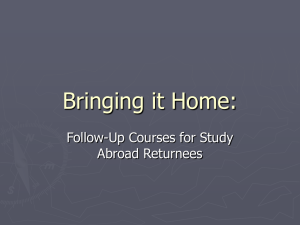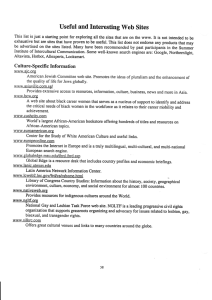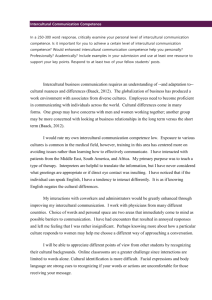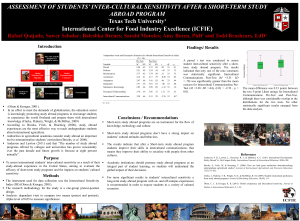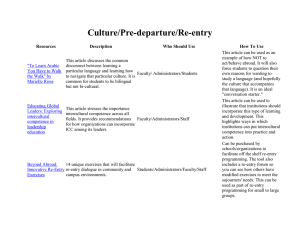intercultural competence
advertisement
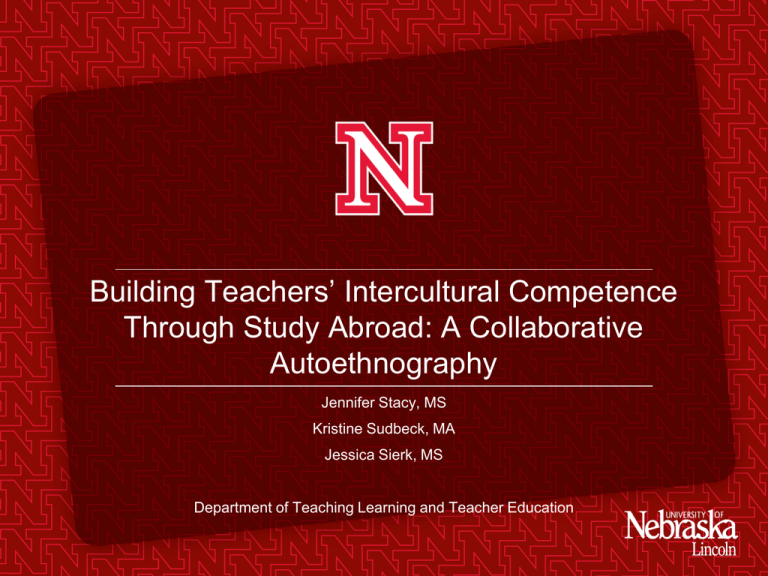
Building Teachers’ Intercultural Competence Through Study Abroad: A Collaborative Autoethnography Jennifer Stacy, MS Kristine Sudbeck, MA Jessica Sierk, MS Department of Teaching Learning and Teacher Education Introduction The Teaching, Learning, and Teacher Education (TLTE) department of the College of Education and Human Sciences at the University of NebraskaLincoln (UNL) seeks to: • engage students in conversations about concrete teaching and learning issues, • provide opportunities for students to consider judgments regarding contemporary educational issues, and • promote the development of critical intercultural competencies for success in today’s increasingly pluralistic society. A short-term study abroad opportunity for graduate students during the summer of 2013 to study post-apartheid schooling in South Africa. Definition • An increasingly globalized world requires teachers to develop intercultural competence: the knowledge of others and self, the skills to interpret, discover and interact, the ability to value others’ values, beliefs, and behaviors, and the capability to relativize one’s self (Byrum, 1997). Core Premises of Intercultural Competence An interculturally competent individual is aware that his/her interpretation of a situation is one of many, and is open to new information or alternative perspectives (Ting-Toomey, 2005). Intercultural competence is NOT a static state that one can acquire or master… Rather, it is a set of skills developed and displayed in the course of interaction and communication with diverse others. (Lee et al., 2012, p. 26) Purpose Main Research Question – How does a short-term study abroad experience contribute to practicing university instructors’ development of intercultural competence? The purpose of this study… – to explore the experiences of three doctoral students before, during and after their travel study in South Africa. Methods • Collaborative Autoethnography – (Chang, H., Wambura Ngunjiri, F., & Hernandez, K.C., 2013) • Data Collection – archival materials (e.g. photos and other artifacts) – self-reflection (e.g. free-form journals) – self-analysis (e.g. pre-determined schematic forms used during school visits and other interactions) – Pre- and post-trip interviews between researchers on the impact that the study abroad experience has had on their teaching practices Researchers/Participants Jen Stacy, MS Jessica Sierk, MS Kristine Sudbeck, MA Setting Cape Town, Western Cape South Africa Pretoria, Gauteng South Africa Learning about schooling in postapartheid South Africa…. …while living history and doing culture. Preliminary Findings Reflective Teacher Practices Relating with CLD Students Study Abroad in Teacher Education Use of Language in the Classroom 1. Reflective Teacher Practices • “A rich point that envelops an experience that expands beyond confronting new countries, new languages and new people and delves into a much more profound reality of being me.” (Stacy-Journal Entry, 7/20/13) • “I have also noticed that a lot of my South African counterparts refer to students as learners. I like this because it places an emphasis on the process of learning. The word ‘students’ implies that they are studying, but I feel as though it is a more passive, rote association.” (Sierk-Journal Entry, 7/10/13) • “Constantly wondering what others think of me as they watch me navigate this new place, what message my social position is sending during each action, each conversation, and perhaps even, each thought. Critiquing and changing myself.” (Stacy-Journal Entry, 7/17/13) 2. Relating with CLD Students • “Some of the others kept mentioning that we were driving on ‘the wrong side’ of the road and that the steering wheel was on ‘the wrong side’ of the car. I’ve been cognitive of myself saying ‘the opposite side’ rather than “the wrong side.’” (Sierk- Journal Entry, 7/6/13) • “Why must everyone conform to learning English? While I realize the importance of having a common language as a lingua franca to be able to communicate across these differing linguistic backgrounds, must it always be to privilege the already privileged?” (Sudbeck- Assignment, 7/23/13) 3. Use of Language in the Classroom “Do you speak French? Bon jour!” To which I responded, “No, but I do speak Spanish.” “Teach me something in Spanish!... Can you write that down?” I wrote down greetings such as 'hola', 'buenos dias', 'adios', and 'ciao' along with their English translations. We practiced them aloud so that they could learn how to pronounce them. One student asked if I would like to learn something in Sepedi, to which I excitedly obliged. "Ashe. A-S-H-E. Ashe. That means 'hi' in my language.“ (Sudbeck- Field Notes, 7/23/13) “There is no real language barrier, as we all speak English, but I recognize that I am not doing language in the same way my classmates are. Yet, our conversation works; its puzzles make it rich. We are languaging.” (Stacy-Journal Entry, 7/12/13) 4. Study Abroad in Teacher Education “The quest for understanding such a sedimentary system is lifelong.” (Stacy, Journal Entry, 7/20/13) “Here [South Africa] I have no real comfort zone to fall back on, so I’m forced, in a way, to negotiate the unfamiliar.” (Sierk-Journal Entry, 7/9/13) “Nothing extraordinarily different from my frame, but different enough to take a moment to notice and to ponder.” (Stacy-Journal Entry, 7/20/13) Discussion Alternative Perspectives Fluidity Skill Set Semantics Lifelong learning Navigating rich points • • • • • • • “Opposite” vs. “wrong” “Student” vs. “learner” • Challenging the status quo • • English as a lingua franca Recognition and experience of languaculture and rich points (Agar, 1994) Ever-evolving sociopolitical contexts Classroom contextualization Constant reflection Constant juxtaposition Flexibility Inclination for travel Cosmopolitan Identity Recognizing rich • Personal and professional points in the identity that is in and of the classroom world • Work of art that is an ongoing transaction with the world (Hansen, 2011) • • • Materials and topics Challenging students Permitting uncomfortable moments to happen Conclusions • Implications – Continuous evaluation of study abroad programs to demonstrate the educational outcomes with intentions to improve the programs or raise awareness about their value (Emert & Pearson, 2007) – Raise awareness of the value of study abroad for practicing teachers in a graduate program in education • Limitations – Short term study abroad – Focus only on university instructors in the field of education Conclusions • Areas for Future Research – Longer study abroad opportunity – Longitudinal follow-up study – Focus on K-12 teachers and university instructors in different fields References • • • • • • • • Agar, M. (1994). Language shock: understanding the culture of conversation. New York: Will Morrow & Co., Inc. Brodin, J. (2010). Education for global competencies: an EU-Canada exchange programme in higher education and training. Journal of Studies in International Education, 14, 569 – 584. Byram, (1997). In Deerdorff, D. 2006, p. 247 Chang, H., Wambura Ngunjiri, F., & Hernandez, K.C. (2013). Collaborative Autoethnography. Walnut Creek, CA: Left Coast Press, Inc. Emert, H.A., & Pearson, D.L. (2007). Expanding the vision of international education: Collaboration, assessment, and intercultural development. New Directions for Community Colleges (Special Issue: International Reform Efforts and Challenges in Community Colleges), 138, 67-75. Hansen, D. (2011). The teacher and the world: a study of cosmopolitanism as education. Abingdon, Oxon: Routledge. Lee, A., Poch, R., Shaw, M. & Williams, R. (2012). Engaging Diversity in Undergraduate Classrooms: A Pedagogy for Developing Intercultural Competance. ASHE Higher Education Report, 38(2): 23-43. Planel, C. (2008). The rise and fall of comparative education in teacher training: should it rise again as comparative pedagogy?. Compare, 38 (4) 385-399. Back Page
